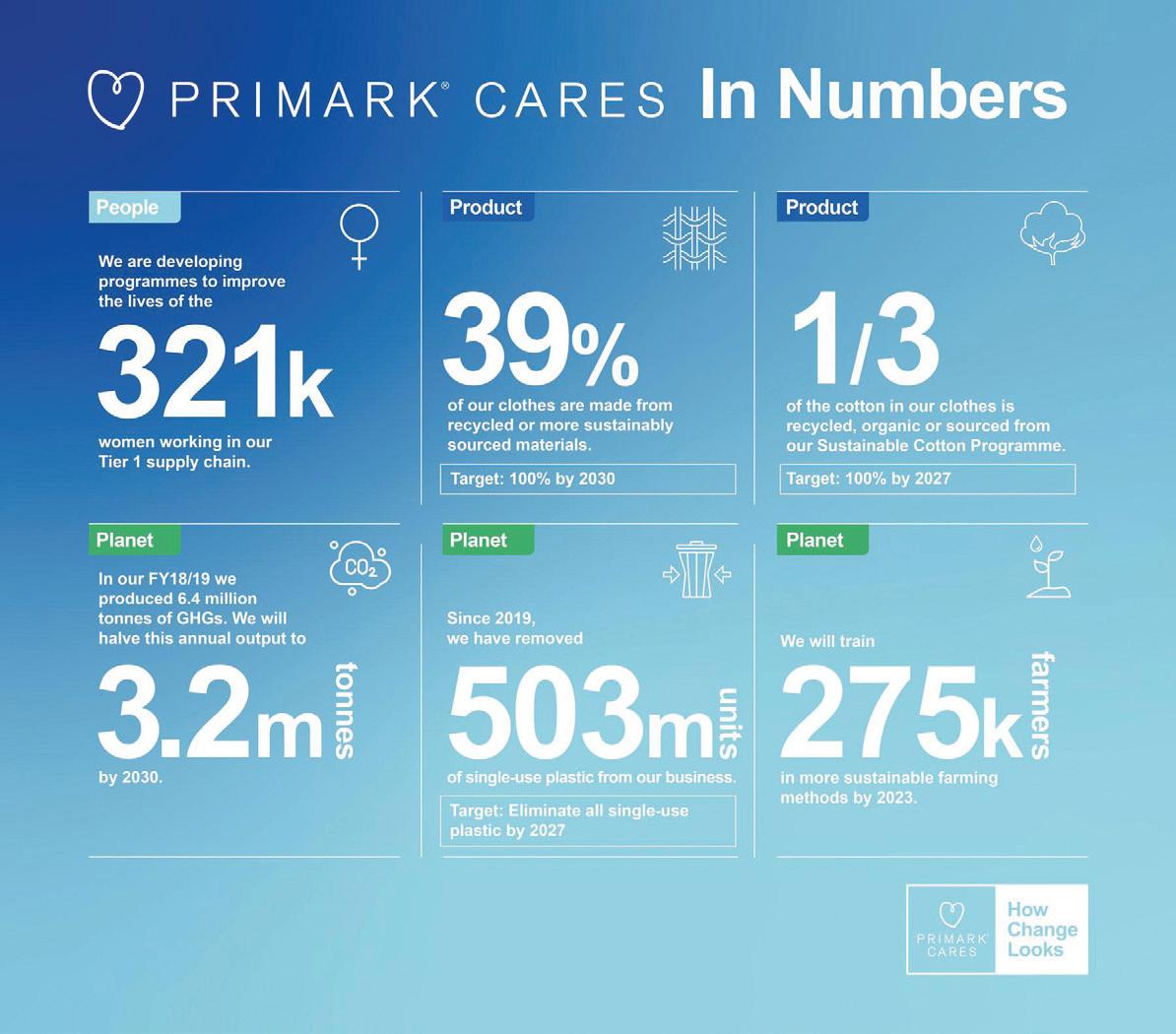
7 minute read
RETAIL FEATURE
CLOTHING REGENERATION Z
Primark Cares is on a mission to transition the high street retailer’s relationship with fashion, from materials and supply chains to the repair and reuse economy of tomorrow. Products of Change catches up with director Lynne Walker to talk affordable sustainability.
TOP: Primark launched its Primark Sustainable Cotton Programme in 2012 and is now the largest of its kind in the fashion sector.
RIGHT: Lynne Walker, director at Primark Cares will be talking at SILC 2022.
Primark Cares is a fantastic initiative to make sustainability accessible and affordable. Can you give us an overview of how you are doing this?
Primark has been working hard to become a more sustainable business for over a decade but our Primark Cares strategy – launched last year – accelerated this. We’ve set ourselves ambitious commitments to change our business model, including the way we make and source our products.
Primark Cares is our commitment to doing better, every day – making more sustainable products that everyone can afford, reducing our impact on the planet, and supporting the people who make our clothes.
By 2030, 100% of our clothes will be made using recycled or more sustainably sourced materials. We’re working to become a more circular business to ensure everything will be recyclable by design and focus on strengthening the durability of our clothes.
Ultimately, we believe more sustainable fashion shouldn’t come with a higher price tag, and we have the scale to apply this across everything we do.

What have been some of the biggest wins or greatest impact areas that Primark Cares has seen so far?
Well, already today almost 40% of all the clothes we sell are made from recycled or more sustainably sourced materials under the Primark Cares label, while our Primark Sustainable Cotton Programme, which we started nine years ago, is now the biggest of its kind in the fashion industry. As part of this, we have committed to train 275,000 farmers in the programme by 2023.
We have removed over half a billion single use plastics from our business and have built a team of 130 experts worldwide based in each of our key sourcing markets who inspect every tier one supplier factory in the Primark supply chain at least once a year unannounced. This occurs more frequently in some countries, including China.
We want our customers to make informed decisions and trust the claims we make about our products. We feed into the CMA’s Green Claims guidelines through the British Retail Consortium, so any claims we make around our Primark Cares products are transparent and meet regulatory requirements. We welcome the CMA’s work to ensure that sustainability claims across the industry are rigorous and informative for customers.
We know we need to change – not only do our customers expect it, but we have a responsibility to drive more sustainable behaviours within our business and supply chain. We will transparently report on our progress against our commitments annually, starting in November, and will continue to push ourselves to go further and be open about the challenges we face.
Primark Cares’ Commitments – giving clothes a longer life, protecting life on the planet, improving people’s lives – speak a lot to the principles of circularity such as designing out waste and regenerative business practice. What do these developments look like in day-to-day practice?
Recyclable by design means that our designers and buying teams are starting to design clothes with the end in mind. This means making different decisions at the outset around fabric composition, and what embellishments or components can be used to ensure a garment can be easily recyclable.
This can mean moving towards a single sustainable mono-material for each garment; minimising the use of blends of natural and synthetic fibres, minimising the use of embellishments such as beads and

sequins, ensuring labels or logos are easily removable, designing jeans with removable buttons, or replacing metal rivets with stitches.
Our designers, buyers, and suppliers need to work within the boundaries of current recycling abilities, so we train them to know what design modifications they need to make to help close the loop and move towards better recyclability. We’ve appointed a Circular Product Lead to manage this work internally and a circular design pilot has been completed with our denim and jersey buying teams and suppliers. We are now building the training content to start scaling this by Q4.
Over time, we hope to move to a closed loop system, recycling old clothes and not plastic bottles, allowing us to increase our use of recycled materials. However, the technology to do this is still in its infancy. This can’t happen overnight, but as the industry evolves and innovation scales, we will evolve with it.
Can you tell us about your Sustainable Cotton Programme and the plans to use more regenerative agricultural practices by 2030? What does this involve, in terms of education for farmers, techniques, and assessing the supply chain?
We developed the Primark Sustainable Cotton Programme and launched the first pilot in India in 2013 in collaboration with agronomic experts, Cotton Connect, and the grassroots organisation, the Self- Employed Women’s Association, with the aim of reducing its impact on the environment, changing the way the business sources its cotton and improving the livelihoods of farmers.
Since then, the programme has expanded to Pakistan and Bangladesh with the expertise of local market partners, and has already trained almost 150,000 smallholder farmers, 80% of whom are women. Earlier this year we announced a major expansion of the programme, committing to train 275,000 cotton farmers in more sustainable farming by 2023, an expansion of over 80%.
Primark’s sustainable cotton is grown through a unique process using CottonConnect’s REEL (responsible environment enhanced livelihoods) Programme. Cotton farmers are trained over three years to address an over dependence on chemical fertilisers and pesticides to preserve the biodiversity and help mitigate against climate change. The programme gives back to local farming communities.
On average, farmers in the programme use 40% less chemical pesticides and fertilisers and 10% less water used by acre, with a 14% increase in yield and growth in profits by 200%. Moving forward, the programme will be focused on restoring biodiversity, committing to adopt more regenerative practices by 2030.
What is Primark doing to slow fashion down through repair, upcycling, second-hand purchasing, and the extended life of products? What potential is there for you here?
We’re proud of the quality of the clothes we sell, and we work hard to ensure our customers can wear our clothes time and again. Our commitment is focusing on how we can make them last even longer.
There is currently no industry standard for measuring the durability of clothes. We’ve been reviewing our current testing requirements using the WRAP Longevity Protocol (2013) to inform us of the additional number of washes our clothing needs to meet the guidelines.
Each category will have a different number of washes depending on product type and end use. Starting with denim, all our denim clothing will be washed to the new requirement of 30 washes. This is in line with EMF Jeans redesign and WRAP. We continue to work with suppliers to support improvements on products that don’t meet our durability requirements – for example the use of better dyes or adjustments to fabrics to strengthen them.
We are also working with WRAP and are a signatory to Textiles 2030 – the UK’s most ambitious voluntary agreement designed to limit the impact clothes have on climate change. We’re playing an active part in developing new industry guidelines on durability in WRAP’s clothing longevity protocol. We use this protocol as a guide to ensure that we can substantiate any claims by using the number of washes from the protocol as a benchmark.
We know there is a lot more work to do and strengthening the durability of our clothes will be a process of continuous improvement over time.
We have also launched a customer and colleague programme to show people some easy ways to repair their clothes so that clothing can remain in active use for longer. We have held 48 repair workshops in six cities, including our head office, educating over 470 colleagues and customers with new skills to repair their clothes. These will continue to be rolled out throughout the remainder of this year and then in 2023 we plan to ramp it up further into other markets.
LEFT: Primark in Prague. The retailer is growing a global network of stores, including this stunning location in Prague.
BELOW: Primark Cares in Numbers details some of the staggering stats that the sustainability programme has achieved to date.









